How Smartwatches Measure Sleep: Best Techniques and Accuracy
How Smartwatches Measure Sleep: Unlocking Sleep Monitoring Secrets
How Smartwatches Measure Sleep: Sleep is a critical component of overall health, influencing our physical, mental, and emotional well-being. Historically, understanding sleep patterns necessitated clinical sleep investigations, which were time-consuming and difficult to obtain for everyone. However, the introduction of smartwatches has democratized sleep tracking, providing a convenient and continuous means to monitor sleep from the comfort of our own homes. These gadgets provide significant insights that can help people better understand their sleep habits and make more educated decisions to improve their sleep quality. Sleep patterns can be analyzed over time to reveal potential difficulties such as frequent awakenings or irregular sleep cycles, which may signal underlying health problems.
Smartwatches use advanced technology to completely study several sleep stages, such as light sleep, deep sleep, and REM sleep. This knowledge is critical for anyone trying to enhance their sleeping habits and general health. For example, tracking sleep patterns can assist identify habits or environmental issues that may be interfering with sleep, such as inconsistent bedtimes or an uncomfortable sleeping environment. Furthermore, this information enable users to personalize their routines and make lifestyle modifications to promote better sleep. Modern smartwatches’ simplicity and precision make them an excellent tool for anyone looking to improve their sleep, and hence their health and well-being.
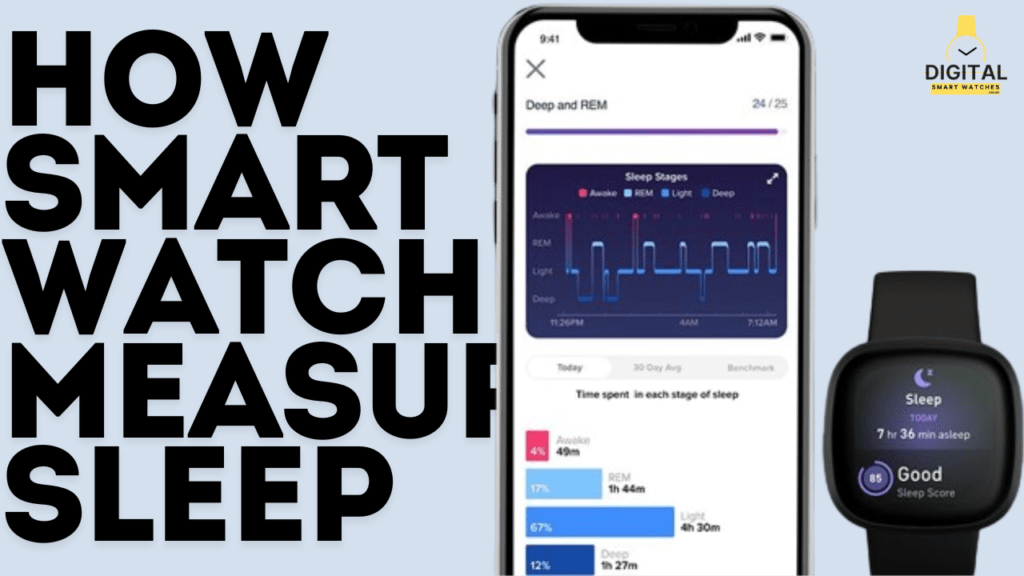
How Smartwatches Measure Sleep: Key Sensors in Smartwatches
How Smartwatches Measure Sleep: Smartwatches use a variety of sophisticated sensors to track and evaluate sleep. Accelerometers, which detect even minor movements, and heart rate monitors, which track heart rate variability to determine sleep stages, are two of the most important. Gyroscopes measure the watch’s orientation and location, increasing the accuracy of movement data. Pulse oximeters, which measure blood oxygen levels, provide important information about respiratory health during sleep. Skin temperature sensors also track variations in body temperature, which helps to provide a more complete picture of sleep patterns. These several sensors work together to capture a vast amount of data, providing a thorough picture of sleep quality and stages.
The data collected by these sensors is processed by powerful algorithms, resulting in a detailed analysis of sleep. Accelerometer data detects movement intensity and frequency, which aids in distinguishing between different sleep stages. Heart rate variability data is critical for detecting REM sleep and deep sleep stages because heart rate patterns differ dramatically between these stages. Pulse oximeter readings can detect breathing anomalies, such as those caused by sleep apnea, but skin temperature data refines the study by linking temperature swings with distinct sleep stages. The combination of various data points enables smartwatches to provide a thorough and accurate assessment of sleep quality, assisting users in understanding and improving their sleep health.
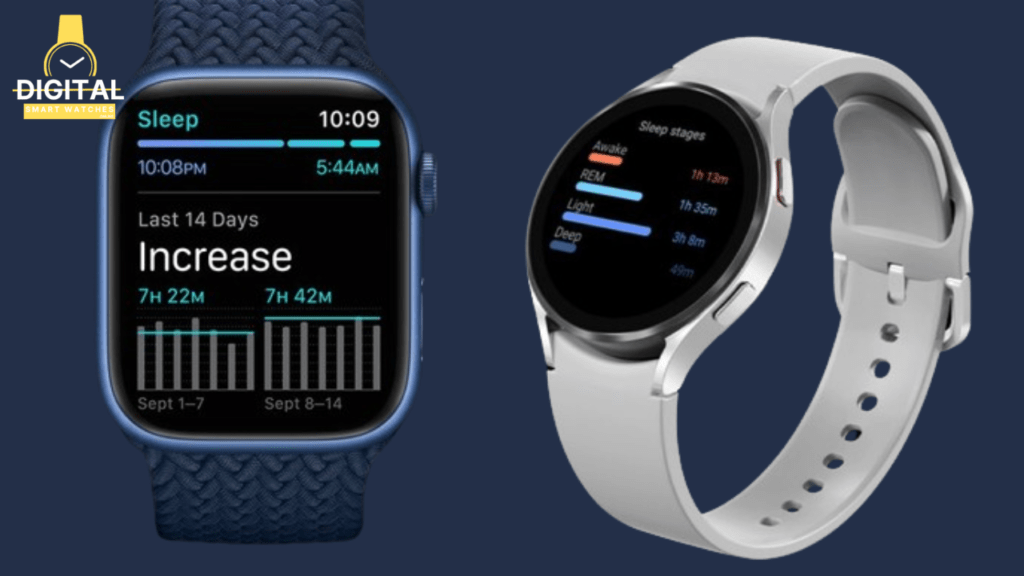
How Smartwatches Measure Sleep: Sleep Tracking Algorithms
How Smartwatches Measure Sleep: Sophisticated algorithms are critical for converting raw sensor data into relevant insights about sleep patterns. These algorithms can determine if a person is awake or asleep by studying motion patterns, distinguishing between times of rest and activity throughout the night. Heart rate variability is another important parameter used by these algorithms, as it gives useful information about the various sleep stages. Heart rate variations aid in distinguishing between light sleep, deep sleep, and REM sleep, each with its own set of physiological changes and brain activity.
Furthermore, these algorithms use additional data from sensors such as pulse oximeters and temperature sensors to improve the accuracy of sleep analysis. Pulse oximeters offer information on respiratory health and oxygen levels during sleep, whereas skin temperature sensors help to comprehend temperature swings related with various sleep stages. By combining data from different sources, the algorithms create a precise analysis of sleep stages, providing users with a comprehensive picture of their sleep quality. This sophisticated understanding allows people to make more educated decisions regarding their sleep habits and overall well-being, resulting in better sleep health and quality of life.
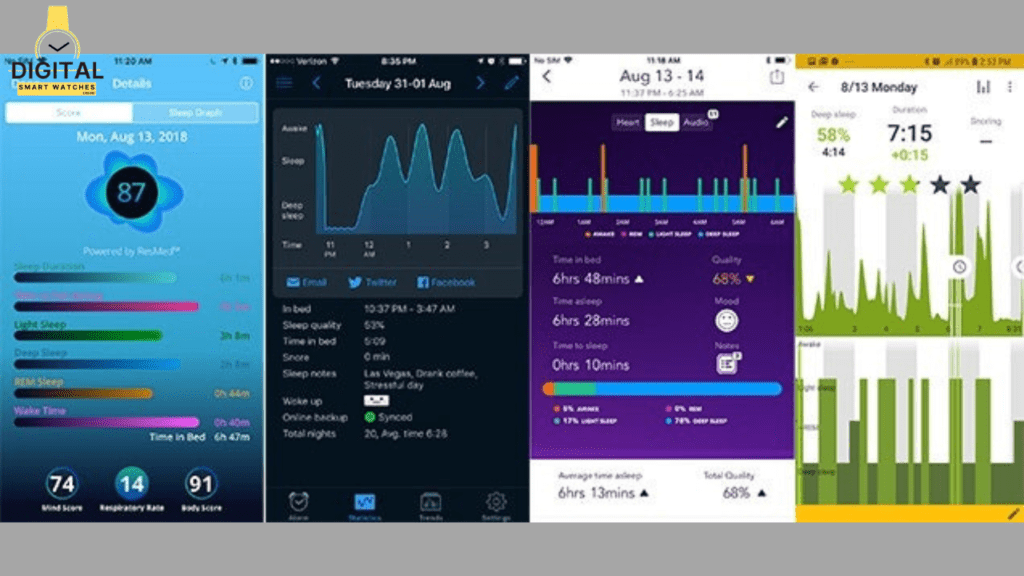
How Smartwatches Measure Sleep: Accuracy of Sleep Measurements
How Smartwatches Measure Sleep: The accuracy of sleep tracking on smartwatches is determined by a variety of factors, including sensor quality and algorithm sophistication. High-quality sensors can gather precise data, allowing for accurate monitoring of sleep patterns. Similarly, modern computers excel at evaluating collected data and transforming it into useful information regarding sleep length and stages. However, even with breakthroughs in sensor technology and algorithms, user compliance can still have an impact on sleep tracking accuracy. Inconsistent smartwatch wear or positioning can hinder data collection, resulting in less trustworthy results.
Several research have looked into the accuracy of sleep tracking on smartwatches against clinical sleep studies. While smartwatches may not be as precise as polysomnography, they have been shown to produce reasonably accurate estimates of sleep duration and phases. Users should understand that wristwatch data is a great tool for tracking sleep patterns and flagging potential concerns, rather than delivering definite medical conclusions. By interpreting the data as indicative, users can utilize it to execute successful sleep improvement measures, such as changing nighttime rituals or enhancing sleep settings, resulting in improved sleep quality and general well-being.
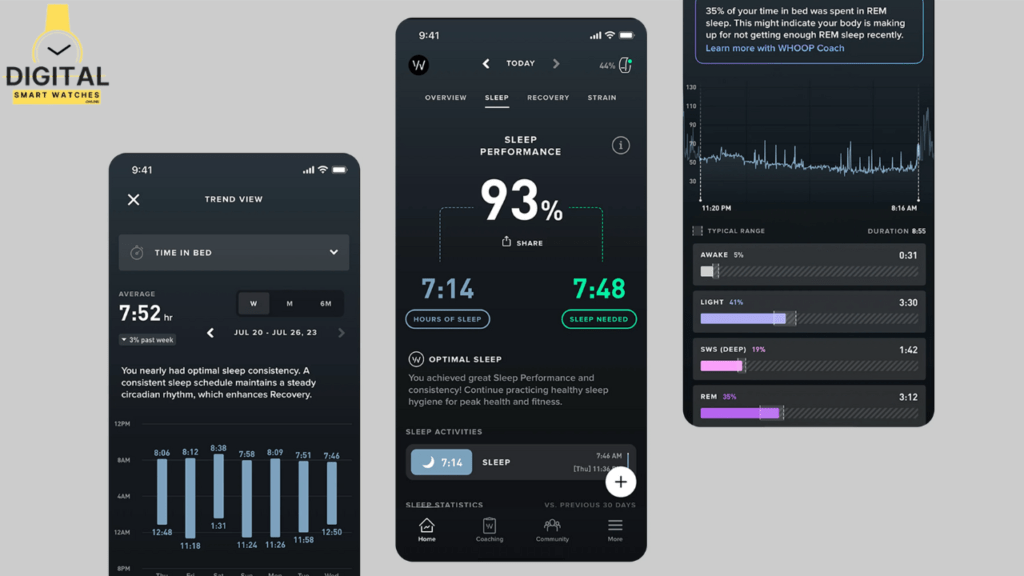
How Smartwatches Measure Sleep: Benefits of Sleep Tracking
How Smartwatches Measure Sleep: Using a smartwatch for sleep tracking provides numerous benefits that go beyond simply monitoring sleep time. For starters, it raises awareness of individual sleep patterns, providing insights on the quality and consistency of nighttime sleep. Users can identify probable sleep disorders like insomnia or sleep apnea by detecting anomalies or irregularities, such as frequent awakenings or restless sleep, allowing for earlier intervention and treatment.
Furthermore, the individualized advice given by sleep data analysis help consumers improve their sleep hygiene routines. These personalized recommendations could include developing consistent nighttime habits, creating a suitable sleep environment, or applying relaxation techniques to reduce sleep difficulties. Furthermore, the ability to analyze long-term sleep trends makes it easier to identify patterns and trends, allowing people to make educated changes to their lifestyle habits to enhance their sleep quality and general health over time.
The combination of sleep data and other health variables provides a comprehensive view of well-being, allowing users to see correlations between sleep patterns and things like physical activity, stress levels, and general mood. This complete approach provides for a better knowledge of the interconnectedness of sleep and other elements of health, developing a proactive mindset toward reaching optimal well-being. Finally, by leveraging the possibilities of smartwatch sleep tracking, individuals can build improved sleep patterns and go on a journey to increased vitality and general wellbeing.
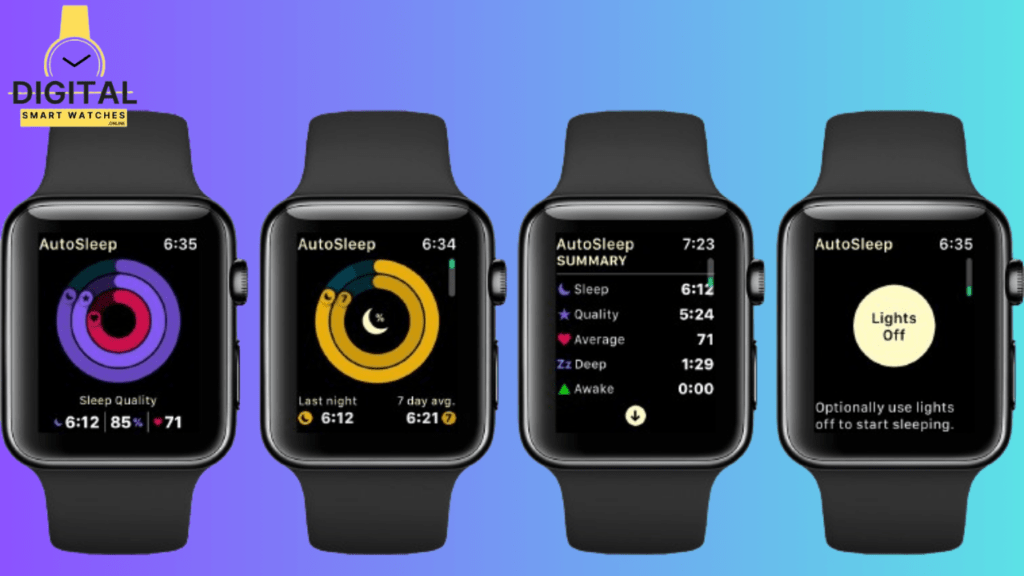
How Smartwatches Measure Sleep: Popular Smartwatches for Sleep Tracking
How Smartwatches Measure Sleep: A plethora of smartwatches have received accolades for their remarkable sleep tracking capabilities, providing to a wide range of customer tastes and needs. The Apple Watch, Fitbit, Garmin, Samsung Galaxy Watch, and Whoop Strap stand out for their unique features and benefits. Apple Watch distinguishes out for its attention on privacy and seamless interaction with health-related applications, which protects users’ data while delivering detailed sleep insights. Fitbit, on the other hand, is praised for its advanced sleep stage analysis, which provides customers with thorough breakdowns of their sleep cycles and patterns.
Garmin smartwatches excel at both fitness and sleep tracking, providing detailed insights into physical activity and sleep quality. Samsung Galaxy Watch impresses with its simple UI and powerful sleep tracking capabilities, which effortlessly integrate sleep data into customers’ health profiles. Furthermore, the Whoop Strap is especially aimed at sports and fitness fanatics, delivering detailed sleep tracking stats and recovery insights to improve performance.
With so many alternatives available, customers can choose a smartwatch that meets their unique requirements and tastes. Whether it’s privacy, detailed sleep analysis, or general fitness tracking, these top smartwatches have a plethora of functions to suit different lifestyles and goals, allowing users to make informed decisions regarding their sleep health and overall well-being.
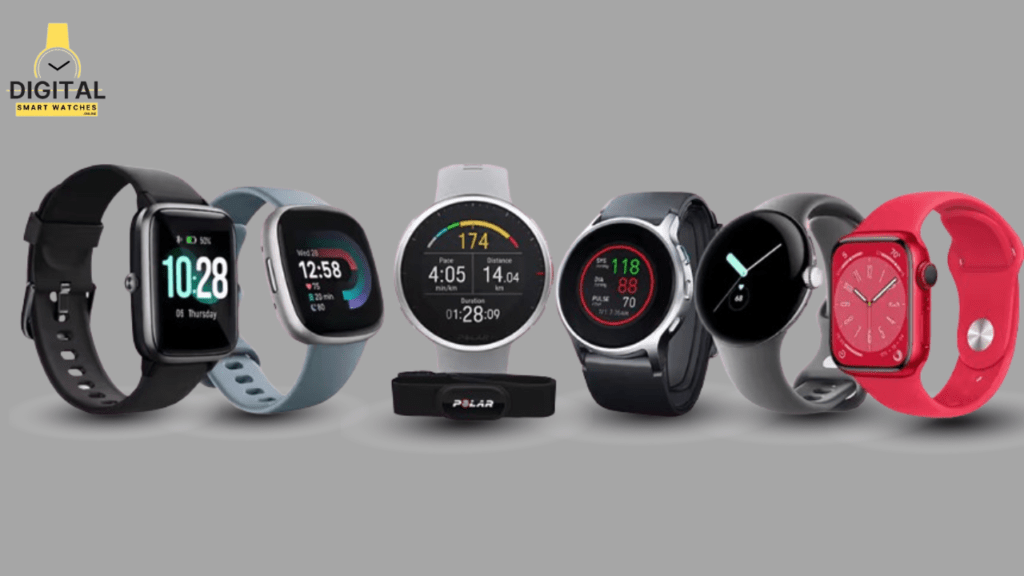
How Smartwatches Measure Sleep: Future of Sleep Tracking
How Smartwatches Measure Sleep: The future of sleep tracking seems promising, thanks to advances in sensor technology, artificial intelligence (AI), and wearable developments. Improved sensors and AI-powered algorithms promise to transform sleep tracking by providing unprecedented precision and individualized insights into sleep habits. Future smartwatches will be able to analyze massive quantities of data to find subtle patterns and trends, allowing users to receive practical recommendations suited to their own sleep needs.
In addition to advancements in sensor technology and artificial intelligence, the introduction of new wearable gadgets such as smart rings or patches holds enormous promise for sleep monitoring. These revolutionary devices provide a more comfortable and unobtrusive alternative to standard wrist-worn trackers, allowing for easy incorporation into users’ daily life. Smart rings and patches, with features such as enhanced sleep tracking and real-time feedback, have the potential to transform how we monitor and manage our sleep health.
Furthermore, the incorporation of sleep tracking data into healthcare systems is projected to become more common in the future. By smoothly integrating sleep data into electronic health records, healthcare providers can get useful insights into its patients’ sleep patterns and identify potential sleep problems at early
At an early stage. This integration enables healthcare practitioners to provide more tailored interventions and treatments, resulting in better patient outcomes. Furthermore, combining sleep tracking data with other health measures, such as activity levels, heart rate, and respiratory health, provides a more complete picture of overall health and wellness.
As the area of sleep tracking evolves, collaboration across technology companies, healthcare providers, and researchers will be critical in driving innovation and elevating the standard of care for sleep health. By leveraging sensor technology, AI-driven algorithms, and wearable advancements, the future of sleep tracking has enormous promise for improving sleep quality, diagnosing sleep disorders, and eventually improving general health and well-being for individuals worldwide.
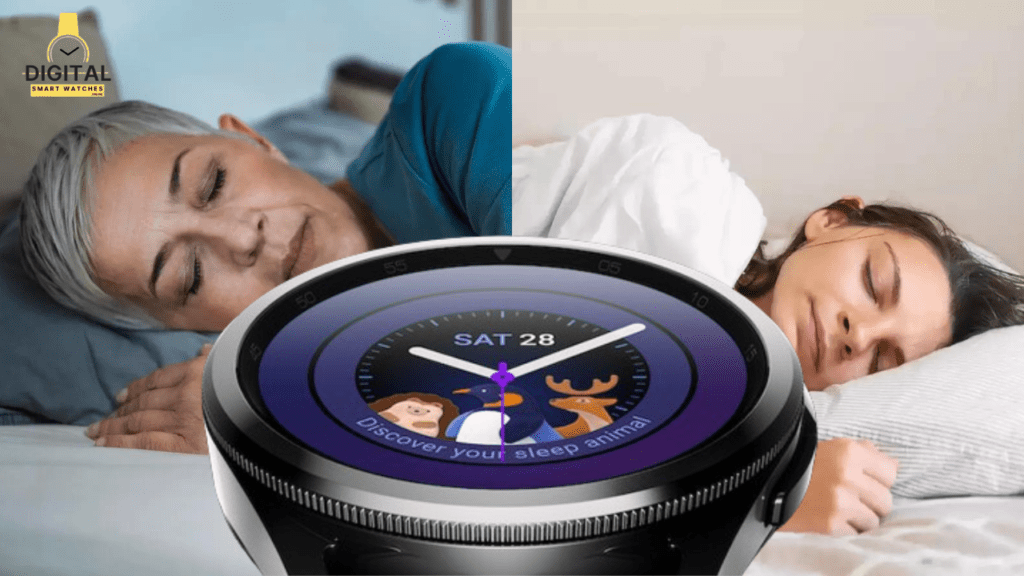
Conclusion:
To summarize, the incorporation of smartwatches into sleep tracking has revolutionized our understanding and management of sleep health. These gadgets provide an easy and accessible way to monitor sleep patterns, delivering useful information about sleep quality, length, and phases. Smartwatches can collect enormous amounts of data using modern sensor technologies and sophisticated algorithms, providing personalized recommendations based on individual sleep needs.
Furthermore, the future of sleep tracking seems bright, with advances in sensor technology, artificial intelligence, and wearable innovations primed to transform the industry. From greater accuracy to seamless connection with healthcare systems, the future of sleep tracking is bright, promising improved sleep quality and general well-being for people all around the world. Collaboration among technology companies, healthcare providers, and researchers continues to drive innovation, the potential for improving sleep health and quality of life is limitless.
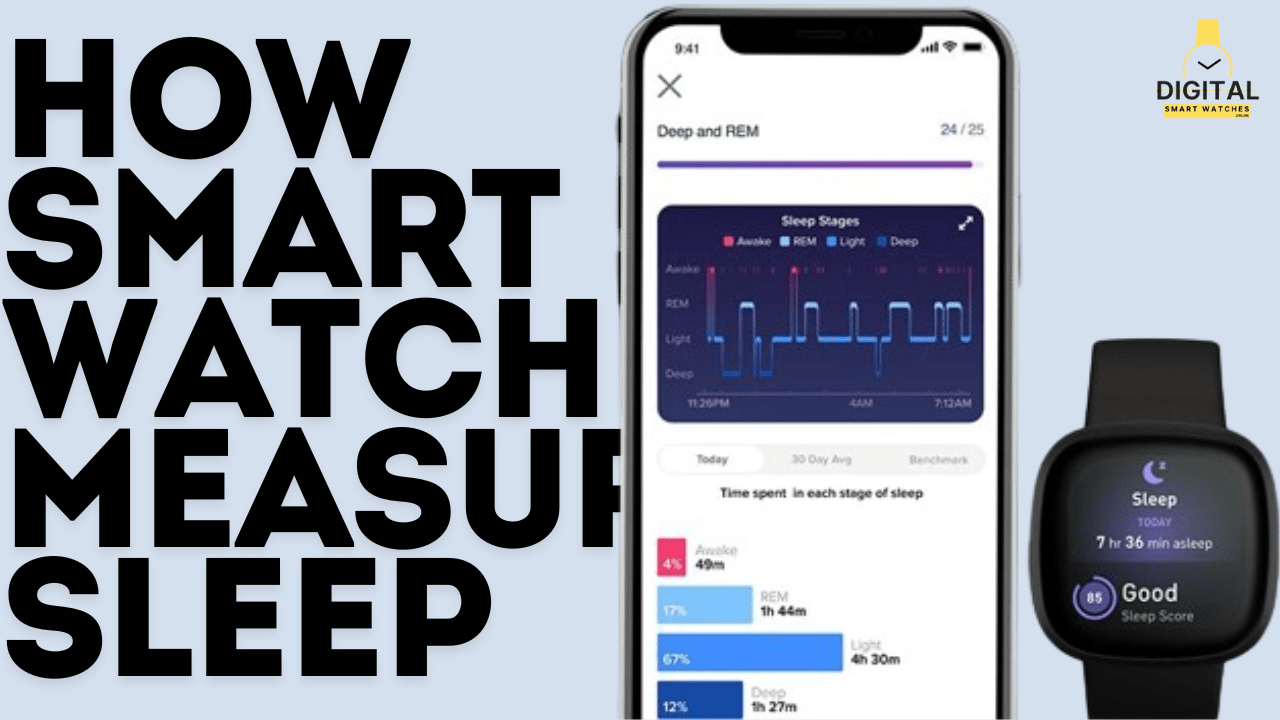
I was looking at some of your articles on this internet site
and I believe this internet site is real instructive! Continue posting.Raise blog range